Brian Mulvaney:
You're going to need page 125 is where everything begins.
Mulvaney (Interview):
My name's Brian Mulvaney. I'm a 7th grade Civics teacher at Davidsen Middle School in Tampa, Florida.
Mulvaney:
So I'm going to give each group a topic, and I'm going to give you ten minutes. That's it.
Mulvaney (Interview):
One of the fundamental things that I've realized going through this is, is I have to have the mentality. It's not teacher centric. It's student driven. And I have to keep in mind of what the students are doing and that's what it's really looking at.
Mulvaney:
Why did they need to get rid of the Articles of Confederation?
Brent McBrien (Interview):
I'm Brent McBrien, Principal at Davidsen Middle School. Teacher evaluation had teachers start to be evaluated on a Rubric System. As opposed to in the past, it was more of a checklist evaluation.
Mulvaney:
We're going to get into the whole.
McBrien (Interview):
The Rubric System has given us some common language to where I can go into a classroom and actually observe a teacher and have a meaningful conversation about what I saw while I was in that classroom.
Student #1:
They couldn't enforce laws.
Mulvaney:
They couldn't enforce laws. A Congress could not enforce law.
Student #2:
They could not collect taxes.
Mulvaney:
They could not collect taxes. We talked about heavy debt.
Mulvaney (Interview):
The observation process is is you first have your pre-conference with either your peer or your principal, and they're going over what, what you're going to do that day.
Mulvaney:
All right, so we're going to start with the Virginia Plan.
Mulvaney (Interview):
And then you have the actual lesson and the observation.
Mulvaney:
Yeah, explain it. Explain it to everybody. I'll pop in with some questions. Don't worry.
Student #3:
It had a federal government, much like ours.
Mulvaney (Interview):
And then you have the post-conference or the reflection part of it.
Mulvaney:
You guys nailed pretty much everything that needed to be there for that.
McBrien (Interview):
I call him my poster child for the EET just because he was probably the first teacher that really embraced it.
Student #4:
Maybe someone brought some cents .
JoAnn Parrino (Interview):
My name is JoAnn Parrino. I'm a Peer Evaluator for the School District of Hillsborough County and I currently observe at ten different schools.
Mulvaney:
Talk about the Federals Papers. Maybe that was an influence.
McBrien (Interview):
A Peer Reviewer does a little bit the same process we do as principals. They play in because they're more content specific.
Parrino (Interview):
This evaluation says that this must be done to score in this domain, this rating. Very similar to what teachers give when they give a Rubric to their class.
Student #5:
Creative assignment in a House of Representatives. And in the Senate each state got two members.
Mulvaney (Interview):
I could tell you when I first started teaching I was one of those people, desks in rows, I'm going to lecture.
McBrien (Interview):
Students would come in and they would copy the notes and he'd, you know, talk at them. So it just lacked a lot of student engagement. He was just very old fashioned.
Student #6:
They wanted states to have more people with more power.
Mulvaney:
All right, good job.
Mulvaney (Interview):
When I was going through it at the time, I think I was doing okay. You know you have your ups and downs as a, as a young teacher.
McBrien (Interview):
You know I was in there a couple of times and would watch him, and I really felt for him but it's just I didn't know what to do for him.
Mulvaney:
Why would they be happy with the Senate?
Student #7:
Because each state got two Representatives or two members no matter what size its population was.
Mulvaney:
Good.
McBrien (Interview):
The Rubric came along and you know went in for that first time it still wasn't good. But when we came out of there, we were actually able to have a conversation about what we saw. And we started to put it against the Rubric.
McBrien:
The first observation I did I remember we went through and you had eight areas of need that we needed to look at that were progressing, developing at the time.
McBrien (Interview):
It goes back to that common language. We were able to sit down after those observations and really get into discussions about you know what would make the classroom better.
JoAnn Parrino (Interview):
It provides the feedback. And having that post-conference and sitting with the teacher and saying, "This is the areas of strengths and these are areas of focus. And here's a few things that you might do to tweak this lesson to make it even better." I feel is what makes the evaluation process useful and valuable.
Mulvaney (Interview):
I'm always open to new ideas and new things to try.
McBrien:
Not one of the students, you know, fretted about going up there or anything and they all got positive reactions.
McBrien (Interview):
We started with student engagement. And as he started to you know tweak what he did, the rows disappeared and became groups and the notes on the board became notes that were becoming student generated.
Mulvaney (Interview):
He saw my frustrations in the beginning with everything I was going through. And he also knew that that wasn't me. He's been very helpful, a lot of ideas, a lot of guiding on how to move through this process.
McBrien (Interview):
As I did my observation, the students were engaged and the questioning was through the roof. One of the things that he's been working on has been the higher order of questioning. And what I saw today, you know, represented that work that he's put in.
Mulvaney:
How is this different than the government from the Articles of Confederation?
Mulvaney (Interview):
I do want to be highly effective. And I knew that there were things that I have to do to get myself there. You know I still have to work on improving and questioning and more higher order kind of things.
Mulvaney:
I know I've made a lot of ground with the questioning, workshops. Just, it, it, to me it's a lot more tangible for me that I can think about it as I'm doing it. You know, assessment. You know I don't, I know I probably should take something on that one.
Mulvaney:
Honestly, I don't, I don't know the answer. I like that answer though.
JoAnn Parrino (Interview):
The system allows for a good model in consistency and I think that that's where peers step in.
Mulvaney:
One other major fundamental change from the older government. Claire?
Claire:
The Congress could carry out laws.
Mulvaney:
They could carry out laws.
Mulvaney (Interview):
The best thing out of it was during the reflection she gave me an idea to actually do when I do the same thing next to her. I'm taking it and I'm using it because I liked it better than even what I did.
Mulvaney:
Nick.
Nick:
They had two houses.
Mulvaney:
All right, they had two houses. That's one of the big differences.
JoAnn Parrino (Interview):
He's open to trying new things, taking a training and them implementing those strategies in his classroom.
Mulvaney (Interview):
It's got to be working to a degree just by me becoming a better teacher.
Mulvaney:
Where would they get more votes? You have the right idea. . In the House of Representatives.
McBrien (Interview):
You've got a very high caliber teacher. Two years ago, not so much. The Rubric played a part in it, but you know it really goes back to Brian. But he had a vehicle in which to get there.
JoAnn Parrino (Interview):
This, to me, is the wave of the future for education.
McBrien (Interview):
What you see is a class that I would put my kid in now.
Mulvaney:
Have a great weekend everybody. Great job today.

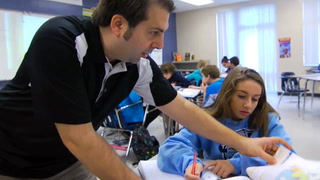
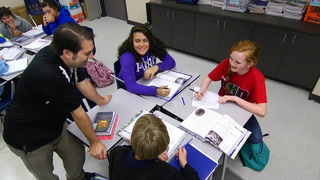
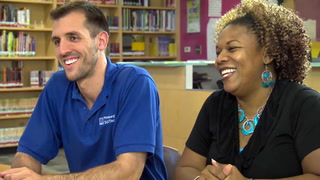
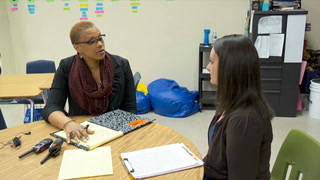
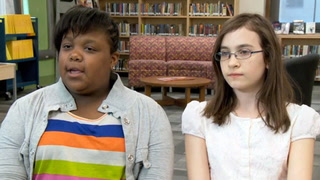








42 Comments
Javin Walker Jul 7, 2020 3:09pm
Having a rubric that not only comes from the principal but also from a peer evaluator, to me, gives a teacher multiple layers of improving themselves in the classroom. Understanding that sometimes one person does not have all the answers or all the fixes and being able to have the discussions with an understanding that these people want you as the teacher to be the most effective you can be in important in the development of a classroom's culture and the well being of the students and teacher.
Raven Groom May 31, 2018 9:59am
Katherine Chapp Mar 24, 2018 7:26pm
Donna Vega Dec 4, 2016 5:21pm
Yesenia Castellanos Nov 23, 2016 2:54am